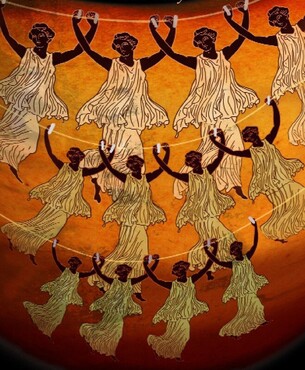 Cover of "The Penelopiad The Play" Cover of "The Penelopiad The Play" In the book, “The Penelopiad” by Margaret Atwood the twelve maids should have been spared. The reasons for this statement are that Penelope should have told Odysseus that she told them to do whatever the Suitors wanted to gain information for her, Penelope told the twelve maids that Odysseus would be happy with them when he returned, and most importantly they also had no choice to be “loyal” to the king. The first reason I think the twelve maids should have been spared is that Penelope should have told Odysseus that she told the twelve maids to sleep and say awful things about her, Odysseus, and Telemachus, to gain information about their intentions. On pages 89 -90 of Margaret Atwood’s book says, “I told my twelve young maids-the loveliest, the beguiling-to hang around the Suitors and spy on them, using whatever enticing arts they could invent... Several of the girls were unfortunately raped, others were seduced, or were hard pressed and decided that it was better to give in than resist.” This quote illustrates that she told them to do what they were killed for. The second reason the maids should have been spared is that Penelope told them that Odysseus would be happy with them for what was being done to them. On page 91, Penelope says to the maids, “‘You must pretend to be in love with these men. If they think you have taken their side, they’ll confide in you and we’ll know their plans. It’s one way of serving your master, and he’ll be very pleased with you when he comes home’” (Atwood). This quote tells us that that the maids believed Penelope would tell Odysseus what they have done. The final and most important reason I will talk about is that the maids had no choice. According to the article, “Women in Ancient Greece,” by Mark Cartwright, “Women in the ancient Greek world had few rights in comparison to male citizens. Unable to vote, own land, or inherit, a woman's place was in the home and her purpose in life was the rearing of children.” Also on page 155, “we had no voice, we had no name, we had no choice…" (Atwood). These quotes mean that the women of this time had no rights including the right to say “no.” The only right they had was to bear children. In conclusion, the maids should have been spared because of the following reasons. The first reason was that Penelope told them to do what they were killed for, and she should have told Odysseus that she told them to do it. The second reason is that Penelope told them that Odysseus would be happy with them and what they had done for her. The last reason is that they had no choice and they killed them anyway. Any questions, comments, or concerns write a comment.
0 Comments
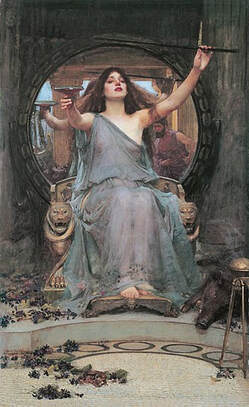 Circe Offering the Cup to Ulysses by John William Waterhouse Circe Offering the Cup to Ulysses by John William Waterhouse Have you ever thought about who would be the best mother of the five books we have covered thus far? I think it is Circe from "Circe" by Madeline Miller. My reasons are she did everything she could to make Telegonus happy, she did everything she could to keep him safe, and end the end let him make his. Clytemnestra, from Colm Tóibín’s "House of Names," chose revenge for Agamemnon over her children; she did not speak to Electra when she came back from Agamemnon's camp. My first reason is that Circe put Telegonus’ happiness over her own. On page 244 of "Circe," “He smiled for the first time and began to sleep in his cradle. He went a whole morning without screaming, and I could work in my garden. Clever child, I said. You were testing me, weren’t you? He looked up from the grass at the sound of my voice and smiled again” (Miller). This tells the reader she stopped doing what she loved to care for him. Clytemnestra dropped everything for her own needs. On page 40 of "House of Names," “I should not have brushed her aside, however, of that I am sure. I was dreaming of fresh clothes, my old bed, a bath, food, a pitcher of sweet water from the palace well” (Tóibín). Electra needed answers to what happened, and she wanted to give herself what she wanted: clothes, a bed, a bath, etc., though she did regret not telling her, but why? Because she felt bad? Or because Electra formed a resentment against her that led to her death. The second reason is that Circe did everything she could to protect Telegonus. Clytemnestra put the care of her children to a man she did not trust. She put a spell over her island, Aiaia, and a second spell for the island where if Athena got past the first spell the island’s animals would protect her son. She also went to the bottom of the sea to Trygon, for his venom to protect him from Athena on his journey to Odysseus, his father. In Miller’s "Circe" it says, “‘Athena would kill my child, and so I defend him,’ I cried. ‘Be witness to the power of Circe, witch of Aiaia.’... White smoke billowed into the air, rising, spreading. It massed, forming a great arc over the island, closing us in” (254). On the same page it says, “If ever she did break through that smoke, the island would rise up in his defense, the beasts and birds, the branches and rocks, the roots of the earth” (Miller 254). Circe went to the bottom of the ocean to protect her son. On pages 278-279 of Miller’s "Circe" says, “Deeper I went, falling into the fathoms of blackness. That water was not my element and it knew it. The chill dug at my bones, the salt scoured my face. The ocean's weight piled like mountains on my shoulders. But endurance had always been my virtue and I kept on... At last, I landed upon the sea’s lowest floor... I cried out: ‘Great Lord of the deep, I come from the world to challenge you.’” On page 280 of "Circe" it says, “‘Still, I said. ‘I must try. For my son.’” Clytemnestra put the care of her children to a man she did not trust. On page 60 of "House of Names," “I knew that Aegisthus’ men would be waiting for her (Electra). And I knew also that Orestes would be taken from the palace by two of the guards (Tóibín). The third reason that Circe is the best mother is that she lets Telegonus go to his father. On page 273 it says, “‘I come to say that you may go, and I will help you.’” She put her need to keep him safe on the island and adapted that need to protect him so he could go and meet his father and become his own man. Clytemnestra sent her kids away by choice. In conclusion, I think Circe is a better mother than Clytemnestra. I think this because she puts her child’s needs above her own, she protects him to the fullest extent of her power, and she let him go to become his own man. If you have any questions write a comment. 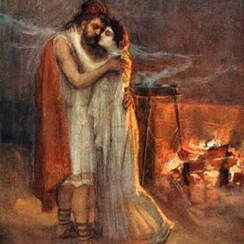 You may wonder what the main themes of "The Lost Books of the Odyssey" are. From reading the novel, I found they are death, aging, and homecoming. In this blog, I will give you the main themes, provide examples, and explain why they are the themes of the novel. The first main theme is death. In the novel, there are numerous instances in which the author, Zachary Mason, talks about death. In chapter 31, “Athena in Death,” it says, “He had often meditated on the form it would take and thought he had considered and prepared himself against every seaborne end but in the event dying was confusing, a jumble of impressions of foam and blood and long empty vistas” (Mason 167). In this quote, Odysseus is thinking about how the sea will kill him and how the idea of death is confusing for him still even though he has killed hundreds of people. The second main theme of the novel is aging. Aging goes along with death very well because as you age you get closer to death. In chapter 44, “Last Islands,” Odysseus reminisces on his past battles and stories by going back to the scenes of which they happened which is like someone’s grandpa talking about the war they fought in long ago as they go to a museum. On page 218 it says, “I could not think of myself as old but my world had become a traveler’s tale.... Though I was approaching my seventieth year I went to the gymnasium daily so that my guests would not wait till I had left and then say, ‘Can this be the man who was Odysseus’” (Mason)? He also talks about how he has told the tales so many times that he hardly remembers the actual events. On pages 218-219 it says, “One day I realized that I had told the stories of the cyclops, the sirens and the duel with Ajax so many times that I no longer remembered the actual events so much as their retellings and the retellings’ retellings, which through a gradual accretion of spurious detail and embellishment had, for all I knew, diverged drastically from the truth” (Mason). The last main theme I will be covering is the theme of homecoming. Similar to death, there is a lot of different varieties of Odysseus’ homecoming. One in which he takes the journey home to find Penelope with a new husband. Mason writes, “The man by the fire stands up looking possessive and pitifully concerned and in an intuitive flash Odysseus knows that this is her husband” (4). There is also a homecoming in which he finds Penelope with men around her when he is disguised as a messenger. In chapter 11, “A Might in the Woods,” reads, “Young gentlemen orbit around her with vacant faces and deferential postures, lighting up when she notices them. There is no furniture except the throne and piles of matted furs strewn on the ground. It smells musky, like an animal’s den. Penelope toys with the black hair of a lanky young man who lounges at her feet, his arm entangled in her legs, and studies me balefully while the men study her” (Mason 57). As you can see there are many homecomings for Odysseus. In the Odyssey, he comes home to a faithful wife. In the article from the Guardian, it says, “Penelope is indeed strong and true: she has kept the suitors at bay for a decade” (Higgins). In conclusion, “The Lost Books of the Odyssey” has three main themes death, aging, and homecoming. Mason focused on these themes for most of the novel. Tell me in the comments if you agree with my choices of the main themes of this novel. 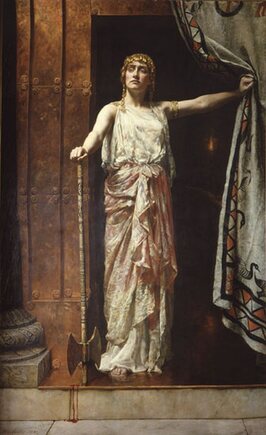 John Collier, Clytemnestra, 1882, Guildhall Art Gallery John Collier, Clytemnestra, 1882, Guildhall Art Gallery Have you ever thought about the way some traits that a child has come from their parents? Clytemnestra, the mother, and Electra, the daughter is similar in many ways. As Marcela said in the Zoom Discussions, "Electra is Clytemnestra Jr" (40). They both have a hunger for power, they both withheld the truth from others, and they both manipulated people. There are other reasons that they are similar, but these are a few. The first way they are similar is they both have a hunger for power. Clytemnestra has a hunger for power when she killed Agamemnon, she saw her children as threats of that power so sent them away. In the book, House of Names by Colm Tóibín, it says, “Once Agamemnon was preparing to enter the palace, we agreed, Electra was to be distracted and confined somewhere until it had all ended. And Orestes was to be removed to a safe place so that he too would not witness what was to transpire” (Tóibín 57-58). Electra has a hunger for power considering she thinks because Orestes was gone the power belonged to her. In the book, on page 232, Electra says that she has “worked and prepared” to have Orestes kill their mother (Tóibín). The second way they are similar is that they both withheld the truth from others. Clytemnestra withheld the truth from Electra when she came home from Agamemnon’s camp where he killed Iphigenia "to appease the goddess Artemis"(The Editors of Encyclopedia Britannica) She just went to her room to mourn. In the book, by Colm Tóibín, it says, “Maybe I should have stayed up through the night taking her into my confidence, telling her what happened to us step by step, minute by minute...” (40). She regretted not doing this. She left the task of telling her daughter that her father killed her sister to the other women. Another instance of her lying was when she promised Aegisthus “everything” (Tóibín 45). An example of Electra withholding the truth when she manipulates Orestes to kill Clytemnestra. I have no quote but when you are tasked to kill someone you should know the consequences. The last reason of many I will explain to you is that they both manipulate people. Clytemnestra manipulates Aegisthus and Electra manipulates Orestes. On page 45 of the book, it says that she promises him “everything” (Tóibín). She does this so he will kill the four of Agamemnon’s guards. If he does this the guards can’t spy on her. Electra manipulates Orestes to kill his mother by saying, “Yes. She killed your father with her own hands, she ordered your kidnapping and the taking of Theodotus and Mitros. She ordered the killing of all their families” (Tóibín 231). The “your” she used emphasizes the familial bond of father and son, to make it more personal to him. In conclusion, Clytemnestra and Electra are similar. They both are hungry for power, withhold the truth, and manipulate people. I wonder if it’s a mother and daughter thing. For example, my mom and I both think of the worst possible scenario for every situation. Tell me about your opinions in the comments. 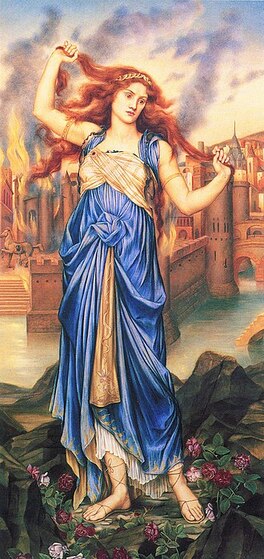 Have you ever thought about how some authors see themselves as characters? In this blog, I will be telling you how Cassandra and the author of Cassandra, Christa Wolf are similar. They are similar because they both were women during wartime, they are in a very oppressive environment, and lastly, they are resilient. Cassandra and Christa are similar because they are both women in wartime. Cassandra’s war was the Trojan War and Christa’s the Second World War. They're in different wars hundreds of years apart but somehow went through some of the same things. For example, they both had to look at their people in the background. Cassandra to see what they don’t, and Christa to spy for Stasi, the secret police in East Germany from 1959 to 1962 (Webb). They also had to deal with the men of their time underestimating or the women in general. On page 120, it says, “they say that Achilles shook himself; he must have believed he was out of his mind. A woman- greeting him but the sword” (Wolf)! I don’t have I citation for an experience Christa went through by we can all assume that she was underestimated, because she was a woman. Another way they were similar was, they were both in a very oppressive environment. Cassandra was told to “be silent” on multiple occasions. Crista Wolf was alive in a time where women were housewives and held their tongues. In the book, on page 126, Priam said, “Be silent, Cassandra” (Wolf). She was forced to join the German Girls League where she was required to attend the club meetings and runs by the Nazi Camp. The last reason they are very similar is they are resilient. Cassandra has been raped, held captive by her father and the enemy, and died. She was raped by Ajax the Lesser, on page 40 it reads, “Marpessa has freely expressed her affection for me ever since I was raped right before her eyes by Ajax, whom the Greeks call Ajax the Lesser” (Wolf). Her father put her in a “... round and lined with wicker“ (Wolf 129) container. Christa had to watch her neighbors, as I mentioned earlier, for the government. Among other things. In conclusion, these two strong women were very similar. They were women during wartime, they were living in a very oppressive environment, and they were resilient was how they were similar. They both lived in patriarchy. Painting by Evelyn De Morgan (1898, London). In the third play of “The Oresteia” Orestes is on trial for murdering his mother, Clytemnestra. The jury is tied between innocent and guilty. Athena, who was directing the whole trial, said she would let him go free if the tally was tied. I will be telling you why the jury’s verdict was right. The first reason is that Apollo told him to kill his mother. Another reason is that he was cleansed so why should he have to die for it? The third reason is that Athena sided with Orestes. The last and final reason is his mother killed his father, Agamemnon, so he killed her in revenge.
First, Apollo told him to kill Clytemnestra. In the second play, “The Libation Bearers” Pylades says, “What of the future? What of the Prophet God Apollo, the Delphic voice, the faith and oaths we swear? Make all mankind your enemy, not the gods” (Aeschylus 217). In this quote, Pylades is saying if you do not murder your mother, you will make the gods your enemy rather than the humans your enemy for killing your mother. Either way, Orestes was in a bad position, he had two troublesome options. He chose to appease the gods and make an enemy with humans. Also, in “The Eumenides” Orestes says, “And Apollo shares the guilt- he spurred me on, he warned me of the pains I’d feel unless I acted, brought the guilty down” (Aeschylus 252). This quote tells us what Apollo said to him. Second, he said he was already cleansed of the crime. In the third play, “The Eumenides” Orestes says, “Long ago at the halls of others I was fully cleansed in the cleansing springs, the blood of many victims” (Aeschylus 251). This quote states that he was cleansed for many of his victims including his mother. If he was cleansed, he should not have to die for that sin, because cleansed means that it does not matter anymore. Another reason is that Athena, the goddess of wisdom, said, “Orestes, I will cast my lot for you. No mother gave me birth. I honour the male, in all things but marriage. Yes, with all my heart I am my Father’s child. I cannot set more store by the woman’s death-she killed her husband, the guardian of their house. Even if the vote is equal, Orestes wins” (Aeschylus 264). This quote states that Athena agreed with Orestes’ actions because Clytemnestra killed the protector of the house. Lastly, he killed his mother out of revenge which is what the gods wanted. On page 252 of “The Eumenides,” Orestes says, “...Ai! my blackhearted mother cut him down, enveloped him in her handsome net-it still attests his murder in the bath. But I came back, my years of exile weathered-killed the one who bore me, I won’t deny it, killed her in revenge” (Aeschylus). This quote explains why he killed his mother. As I explained earlier Apollo told him to do it, thus the gods wanted it. In conclusion, the jury and Athena were right to let Orestes go. The reasons were he was told to kill his mother by a god, he was already cleansed of his crimes, the goddess of wisdom agreed with him, and he kill her out of revenge like he killed her husband out of revenge. |
 RSS Feed
RSS Feed
